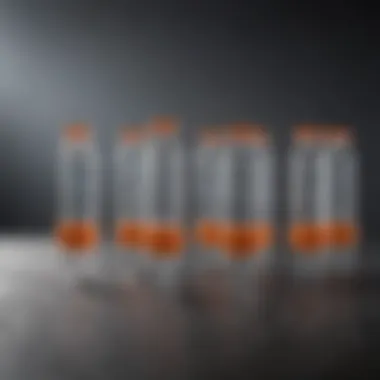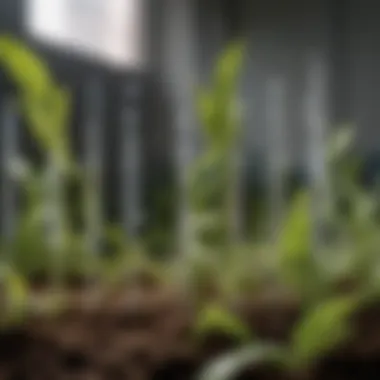Understanding Polypropylene Syringes in Agriculture


Intro
Polypropylene syringes are increasingly recognized in agricultural applications for their diverse usability and unique properties. The choice of materials in agriculture is crucial, as it directly affects productivity, efficiency, and sustainability. Understanding polypropylene and its specific benefits can greatly enhance the outcomes in various agricultural processes.
This article is divided into several sections aimed at exploring the characteristics and applications of polypropylene syringes. We will cover key concepts and terminology related to the material, examine current trends and innovations in the field, and highlight practical applications, offering steps for proper use as well as troubleshooting common issues. The intent is to provide a thorough resource that informs both professionals and enthusiasts about the vital role of polypropylene syringes in modern agriculture.
Preamble to Polypropylene Syringes
In agricultural applications, understanding the role of polypropylene syringes is essential. These tools are significant because they provide accuracy and consistency in various practices such as plant breeding, chemical applications, and research. Their material composition greatly affects their performance and usability.
Polypropylene, as a thermoplastic polymer, presents unique features that benefit agricultural professionals. It offers chemical resistance, which ensures the syringes do not react adversely when handling fertilizers, pesticides, or other agricultural liquids. Furthermore, polypropylene is lightweight, which enhances ease of use across different tasks, minimizing fatigue for users.
Considerations in utilizing polypropylene syringes include durability and cost-effectiveness. Farmers and researchers often face budget constraints, thus the affordability of these syringes adds value to their functionality. As the agricultural sector continues to evolve, the importance of understanding these syringes cannot be overstated, especially in terms of sustainability and environmental impact.
Polypropylene syringes provide precision and reliability, becoming indispensable in modern agricultural methods.
Basic Definition and Composition
Polypropylene syringes are medical-grade tools made from a specific polymer called polypropylene. This material is known for its higher melting point compared to other plastics. The composition typically consists of 90% polypropylene by weight, ensuring they are lightweight and strong. The syringes usually have various capacities, depending on the application needs.
Polypropylene is a versatile plastic, and its properties include resistance to various substances, which is crucial for syringes used in agricultural applications. Additionally, they are processed using injection molding techniques, which enhance their production efficiency and reduce costs. This result in uniform designs that meet precise specifications.
Historical Context and Evolution
The evolution of polypropylene syringes is closely tied to advancements in material science and agriculture. Polypropylene itself was first polymerized in the 1950s. Initially, it was used in industrial settings, but over time, its qualities were recognized for agricultural use, especially in areas requiring precise measures.
In the latter part of the 20th century, there was a shift in agricultural practices that embraced more scientific and research-based methods. This shift brought about the widespread adoption of polypropylene syringes. The syringes became a staple in laboratories and fields alike, establishing a new standard in how substances were administered to plants and soil.
With continued research, the designs and functionalities of polypropylene syringes have improved, integrating ergonomic considerations. Today, these syringes are essential for not just agricultural professionals but also researchers who need reliable tools for experimental purposes. This historical context underscores the significance of polypropylene syringes in revolutionizing agricultural methodologies over several decades.
Characteristics of Polypropylene
Understanding the characteristics of polypropylene is crucial for comprehending its application in agricultural practices. This polymer is chosen for syringe manufacturing because of its unique properties that enhance performance in various agricultural settings. Key aspects include its physical properties, chemical resistance, and biocompatibility, making it suitable for diverse usage.
Physical Properties
Polypropylene syringes are known for their lightweight nature. This reduced weight allows for easy handling during application in the field. The material is also sturdy, providing structural integrity under pressure, which ensures consistent dosage delivery. Additionally, polypropylene has a high tensile strength, allowing it to withstand impact and mechanical stresses that may occur during agricultural tasks.
Another notable physical characteristic is transparency. Many polypropylene syringes are available in clear variants, allowing visibility of liquids. This feature is particularly useful in monitoring the contents, ensuring that operators can easily identify the volume and type of material being dispensed.
Chemical Resistance
The chemical resistance of polypropylene is one of its most vital characteristics in agricultural applications. This material does not react easily with many chemicals, ensuring that the integrity of both the syringe and the substances within is maintained. When handling fertilizers, pesticides, or other chemicals, the risk of interaction is minimized. This factor not only extends the lifespan of the syringe but also enhances safety during operations.


Furthermore, polypropylene's resistance to moisture and various environmental factors makes it suited for outdoor agricultural use. It does not absorb water, which helps maintain the syringe's effectiveness in wet conditions.
Biocompatibility Considerations
In agricultural applications, biocompatibility can be a critical factor, especially when syringes are used to administer substances to plants or animals. Polypropylene is generally recognized as a biocompatible material, meaning it does not produce adverse reactions when in contact with living organisms. This quality makes it suitable for injecting nutrients or medications, as it minimizes the risk of harmful effects.
However, while polypropylene is biocompatible, farmers and researchers should ensure that the specific substance being used in conjunction with the syringe is also safe. Conducting thorough checks on both the syringe and the formulation will ensure the best outcomes for agricultural applications.
Overall, the characteristics of polypropylene render it an effective choice for syringes in a range of agricultural processes. Its lightweight nature, chemical resistance, and biocompatibility reinforce its essential role in modern agricultural practices.
Advantages of Using Polypropylene Syringes
The choice of syringe material plays a crucial role in agricultural applications. Polypropylene syringes have gained prominence due to their unique advantages. Their properties make them particularly suitable for various tasks in agriculture. Understanding these benefits is essential for farmers and researchers alike.
Durability and Longevity
Polypropylene syringes are recognized for their durability. They exhibit substantial resistance to breakage, which is a significant concern in agricultural settings. This robustness means they can withstand impact and rough handling, often encountered in fieldwork. The longevity of these syringes maximizes their usage life, leading to fewer replacements and reduced waste. Moreover, their ability to maintain integrity under a range of environmental conditions contributes to their reliable performance during long-term usage.
Cost-Effectiveness in Agriculture
The economic aspect is a vital consideration for any agricultural operation. Polypropylene syringes offer a clear advantage in this domain. Their production cost is relatively low when compared to glass or other materials. This lower cost does not compromise quality; rather, it facilitates bulk purchasing for large agricultural enterprises. With their durability and reusability, these syringes can lead to significant savings over time. Farmers notice that they do not need to frequently replace them, thereby optimizing operational costs.
Lightweight and Ergonomic Design
The design of polypropylene syringes is another notable advantage. They are lightweight, which enhances their ease of use in the field. This characteristic is particularly beneficial during prolonged tasks, as it minimizes user fatigue. The ergonomic design also ensures that handling is comfortable, allowing for precise application in sensitive procedures. Ease of dexterity and control can significantly influence the effectiveness of agricultural applications, making polypropylene syringes an excellent choice for both amateur and professional farmers.
Polypropylene syringes combine functionality with farmer-friendly design, making them indispensable in modern agricultural practices.
In summary, the advantages of polypropylene syringes arise from their durability, cost-effectiveness, and user-friendly design. These factors contribute to their efficiency in agricultural applications. Understanding these benefits enables farmers to make informed choices, optimizing both productivity and resource management.
Applications in Agricultural Practices
The application of polypropylene syringes in agriculture plays a crucial role in enhancing efficiency and precision across various farming practices. Their lightweight nature, resistance to chemicals, and durability make them highly suitable for several agricultural tasks. Understanding these applications helps farmers and researchers optimize their techniques, ensuring better outcomes and resource management.
Plant Breeding and Propagation Techniques
Polypropylene syringes are particularly valuable in plant breeding and propagation. Their use allows for accurate delivery of growth hormones, nutrients, and even genetic material into plant tissues. This precision is critical in techniques such as micropropagation, where minute quantities of substances must be applied to sterile environments. Employing these syringes enhances the success rate of tissue cultures and ensures a higher yield of healthy plants.
Additionally, their ability to withstand various temperatures and pressures without deforming ensures that the injected solutions remain uncontaminated and effective. Farmers and agronomists appreciate the ease of use and the reliability that polypropylene syringes provide in these sensitive applications.
Chemical Applications and Dosage Management
In the realm of chemical applications, polypropylene syringes stand out due to their chemical resistance. These syringes can handle a wide range of agricultural chemicals, including pesticides and fertilizers. This is essential in ensuring that the agents are applied accurately and in appropriate dosages.


Efficient dosage management is a significant benefit in preventing over-application or under-application, which can lead to crop damage or pest resistance. The clear markings on the syringes help users measure the right amount, fostering responsible use of chemicals. This not only promotes plant health but also aligns with sustainable agriculture practices by minimizing environmental impact.
Usage in Research and Development
Research in agriculture often requires precise and reproducible methods. Polypropylene syringes find extensive use in research laboratories for the administration of substances to plants or soil. They allow researchers to conduct experiments involving various growth conditions and responses to treatments without introducing variables from different container types.
Moreover, custom designs can be engineered for specific experimental needs, facilitating innovations in plant science. Their widespread adoption in research settings underscores their significance in advancing agricultural knowledge and practices. The ease of sterilization and resistance to various solvents further cement their position as essential tools in agricultural research.
"The comprehensive applications of polypropylene syringes not only enhance agricultural productivity but also pave the way for sustainable farming practices."
In summary, the versatility and reliability of polypropylene syringes empower farmers, researchers, and agronomists. Their applications in plant breeding, chemical management, and research contribute significantly to better farming practices, making them an indispensable tool in modern agriculture.
Environmental Impact of Polypropylene Syringes
Understanding the environmental impact of polypropylene syringes is essential in today's agricultural practices. As agriculture faces increased scrutiny over sustainability, the materials used become focal points of discussion. Polypropylene, as a versatile and commonly used polymer, holds potential benefits, but also challenges that must be addressed for responsible application.
Manufacturing and Material Sustainability
The manufacturing process of polypropylene syringes involves several steps that influence their overall sustainability. Polypropylene itself is derived from fossil fuels. This raises questions about carbon emissions and resource depletion. However, the production process has seen advancements aimed at minimizing ecological footprints.
- Resource Efficiency: Modern production techniques focus on using fewer raw materials, ultimately leading to a reduced impact on the environment.
- Energy Use: Efforts to utilize renewable energy sources in manufacturing can significantly lessen the carbon output associated with syringe production.
- Material Properties: Polypropylene is lightweight, which can lower transportation-related emissions when compared to heavier materials.
By enhancing manufacturing efficiency and reducing energy demands, the agricultural sector can leverage polypropylene syringes while considering sustainability.
End-of-Life Considerations and Recycling
Once polypropylene syringes reach the end of their useful lives, it is crucial to consider their disposal and recycling options. Improper disposal can lead to environmental pollution. In recent years, there has been a push for better practices around recycling these syringes.
- Recycling Challenges: One challenge is that polypropylene is not always accepted in curbside recycling programs. Farmers and users should be educated on local recycling facilities that accept this material.
- Reclamation Programs: Some organizations are developing reclamation programs specifically for agricultural plastic waste. These programs aim to collect used syringes and recycle them back into the system.
- Innovative Solutions: Research is ongoing to create biodegradable alternatives or modify polypropylene to enhance its recyclability.
By adopting responsible end-of-life strategies, agricultural practices using polypropylene syringes can contribute to a circular economy.
Addressing the environmental impact of polypropylene syringes requires ongoing dialogue and action within the agricultural community. With a focus on sustainable manufacturing and responsible end-of-life practices, farmers and industry professionals can make informed choices that benefit both agriculture and the environment.
Challenges and Limitations
Understanding the challenges and limitations associated with polypropylene syringes in agriculture is crucial for professionals in this field. While these syringes offer significant advantages, they are not without issues that can affect their efficacy and safety. This section will explore two main challenges: potential chemical interaction issues and regulatory compliance challenges.
Potential Chemical Interaction Issues
Polypropylene syringes are generally known for their robust chemical resistance. However, certain chemical interactions can still occur. These interactions may lead to the degradation of either the syringe material or the contents being dispensed. For instance, some strong solvents or highly reactive chemicals might compromise the integrity of the polypropylene. This can be particularly concerning in agricultural settings, where precision in chemical applications is critical. If a syringe fails to maintain integrity, the results could be catastrophic, leading to contamination or ineffective dosing of fertilizers and pesticides. Farmers and agricultural professionals must be aware of the specific chemicals they handle and ensure compatibility with polypropylene.
Proper testing and understanding of chemical interactions can help avoid potential failures when using polypropylene syringes.


Regulatory and Compliance Challenges
The agricultural sector is heavily regulated for good reasons, including consumer safety and environmental protection. Polypropylene syringes must meet various standards and regulations, depending on the region and intended use. Compliance can become a burden for manufacturers and users alike, especially small-scale farmers who may not have the resources to navigate complex regulatory frameworks. It's essential for anyone using polypropylene syringes to stay updated on current regulations, including those related to material safety data sheets (MSDS) and proper disposal methods.
Maintaining compliance often requires additional training and resources, which can strain budgets, particularly in smaller operations. Understanding these regulatory hurdles is vital for positive outcomes in agricultural practice, ensuring not just productivity, but also safety and sustainability.
Future Trends in Polymers for Agriculture
The field of agriculture is increasingly recognizing the importance of polymers, particularly polypropylene, in enhancing productivity and sustainability. Future trends in polymers, especially in applications like syringes, hold promising potential for the agricultural sector. By exploring new materials and design innovations, the aim is to meet growing demands for efficiency, safety, and environmental considerations. This section discusses specific elements indicative of progress in this area.
Research Directions in Material Science
Material science is at the forefront of advancing polymer technologies. Researchers are investigating biopolymers and other biodegradable options that could replace traditional polymers, resulting in less environmental impact. Polypropylene, despite its utility, also faces scrutiny regarding its end-of-life processes. Therefore, research is focused on:
- Developing biocompatible alternatives: Exploring materials that break down naturally without leaving harmful residues.
- Enhancing properties of existing polymers: Improving chemical resistance and durability through molecular engineering.
- Optimization for specific agricultural practices: Investigating how different formulations of polypropylene can be tailored for specific agricultural needs.
These directions suggest a significant shift towards sustainable practices that maintain agricultural efficiency without compromising environmental integrity.
Innovations in Syringe Design
Innovation in the design of polypropylene syringes is essential to match the evolving demands in agricultural applications. Attention to ergonomics and functionality enhances the user experience and efficacy of these tools. Innovations being explored include:
- Smart Syringes: Incorporating sensors that can measure and report dosage in real time, ensuring accuracy in chemical applications.
- Ergonomic features: Redesigning syringes to reduce strain during use, important for users in large-scale operations.
- Customizable capacities: Allowing for variable sizes based on user needs, thus reducing waste and improving precision.
These design innovations can lead to improved outcomes in various agricultural practices, from planting to chemical application, thereby promoting better crop management.
In summary, the future of polymers in agriculture involves a synergy between material science and practical design, paving the way for enhanced efficiency and sustainability.
The End and Summary
In closing, this article has investigated the multifaceted role of polypropylene syringes within agricultural contexts. Through a systematic exploration of their characteristics, advantages, applications, and potential challenges, the importance of this material emerges clearly. Polypropylene syringes are essential tools for various agricultural practices, helping professionals conduct precise applications, enhance productivity, and promote sustainability.
The understanding of polypropylene’s properties such as durability, chemical resistance, and biocompatibility has proven invaluable. These qualities not only make the syringes effective in plant breeding and chemical applications but also highlight their effectiveness in research settings. This clear operational advantage forms the foundation for their increasing popularity among farmers and agricultural researchers.
As the agricultural industry continues to embrace innovative materials, recognizing the characteristic strengths of polypropylene syringes becomes critical. Continuous improvements and adaptations in both materials science and syringe design are necessary to meet the evolving demands of sustainable agricultural practices. One must also consider the environmental impact as companies seek to balance productivity with responsible waste management and recycling initiatives.
"The integration of polypropylene syringes in agricultural processes exemplifies a thoughtful approach to modern farming needs, blending effectiveness with a commitment to environmental stewardship."
In summary, this article has provided a comprehensive overview of the vital role polypropylene syringes occupy in agriculture, demonstrating their significance in enhancing efficiency and promoting sustainable practices. By considering the future outlook, we can prepare for the advancements that will drive further integration of these syringes in agricultural applications.
Recap of Key Points
- Polypropylene Syringes: These syringes are characterized by their durability, chemical resistance, and biocompatibility, making them suitable for agricultural purposes.
- Applications: They find extensive use in plant breeding techniques, precise chemical applications, and various research methodologies, making them an invaluable asset in modern agriculture.
- Environmental Considerations: Understanding the manufacturing processes, implications for sustainability, and recycling efforts is crucial in evaluating the overall impact of polypropylene syringes on the environment.
- Challenges: Potential chemical interaction issues and regulatory compliance are notable challenges that need to be addressed as agriculture relies more on these materials.
- Future Innovations: Ongoing research and design innovations signal a promising future for polypropylene syringes in agriculture, aligning functional benefits with sustainability goals.
Final Thoughts on Future Outlook
The prospective future for polypropylene syringes in agriculture appears bright, driven by an emerging nexus of research, technology, and sustainable practices. As the agricultural landscape evolves, the demand for versatile, reliable, and environmentally conscious tools will grow.
Fostered by ongoing research in material science, future iterations of polypropylene syringes are likely to become even more efficient and functional. Innovations may focus on enhanced designs that cater to specific agricultural applications or improved recyclability, aligning with the broader pursuit of sustainable farming methodologies. The agricultural sector's ability to maintain a balance between usability and environmental responsibility will define the trajectory of polypropylene syringes in the future.
Overall, embracing technological advancements along with ecological considerations will ensure that polypropylene syringes remain a central tool for both current and future agricultural practices. The journey ahead holds exciting opportunities for innovation and practical application, informing and inspiring those who work tirelessly to cultivate the land.







